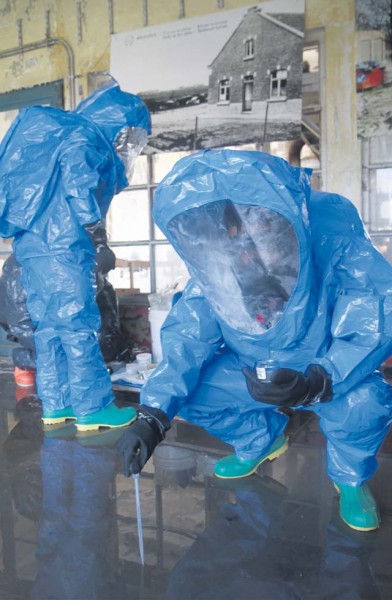
HALLE, Belgium — Clutching a high-tech sensor with thick rubbery gloves, Sgt. Tameka Dubose peered through her oxygen mask and fogging plastic hood checking for a suspicious substance inside a dilapidated building.
Water leaks dripped from overhead pipes. Her chunky rubber boots crunched on broken glass and debris as she walked to fellow 773rd Civil Support Team Soldiers to discuss her findings.
“We have to adjust for not being able to see well or to grip,” Dubose said. “We do this all the time, so you get used to it.”
A 7th Mission Support Command unit, the 773rd CST is made up of Soldiers who survey potential chemical, biological, radiological and nuclear hazards. They spent the last week of October in the suburbs of Brussels, Belgium, taking part in CBRN Week, a training event where the team honed their ability to employ highly sensitive and technical equipment to identify toxins and strengthened a long-standing partnership with Belgian firefighters.
For the past five years, 773rd CST Soldiers have worked with Belgian first responders. In the past, the Americans partnered with the Zaventem station. Since last year, Belgian fire stations underwent an organizational realignment into a regional force.
This year, roughly 50 Belgian firefighters from Hulpverleningszone Vlaams-Brabant West took part. Meanwhile, the 773rd underwent a 70 percent personnel turnover. Of the 19 Soldiers taking part, only four had trained previously with the Belgians.
“It’s a new location, and for many of us, it was the first time together,” said Capt. McVay Chambers, who serves as the 773rd’s operations officer. “But we have had a good working relationship.”
After getting acquainted and setting up living quarters in the fire station, the U.S. Soldiers explained their sampling and decontamination procedures. Then, the Belgians did likewise, Chambers said.
“It was one of those things; we looked at how each other does business, then we integrated and came to a common ground,” Chambers said. “So, if we do come out to respond together, we’re talking the same language, doing the same thing.”
While training filled their days during the weeklong exercise, the U.S. troops did, however, get to sample Belgian chocolate. A local producer in Halle stayed open late just for them so they could stop by one evening after training.
In Relegem, a suburb five miles northwest of Brussels, is Zellick Kaserne. Once home to Belgium’s balloon reconnaissance corps, Zellik is now PIVO, a Belgian training center for police, firefighters and paramedics. Inside an old run-down building their planners staged the scene of mayhem and potential hazards for the culminating event.
Broken glass and debris covered the floors. A simulated casualty had fallen amid the rubble. Streams of water flowed from busted pipes. In the scenario though, it may not have been water. That’s what the survey teams were sent in to determine. First the Beglians went in followed by the U.S. Soldiers, as backing up first responders is their standard procedure.
Under colorful plastic suits, team members could hear their own breath as they used oxygen tanks that were similar to what a scuba diver uses. They carried sensors to determine toxins and collected photos for leaders outside to see what had happened.
Working together takes patience and often humility. When hazardous materials could have been a threat to both teams, communication and coordination were key to safely removing what would, in a real situation, be contaminated.
Outside at the decontamination station, a Belgian firefighter asked Sgt. 1st Class Terrence Houser, an operations NCO with the 21st Theater Sustainment Command, a question in accented English, his voice muffled behind his thick plastic oxygen mask. Houser couldn’t quite hear and motioned that he didn’t understand. Turned-up hand gestures and head shaking followed.
“Where … is the zipper on the suit?”
Houser pointed to his back. They solved the problem.
Belgian 1st Lt. Christopher Gueders of the 14th CBRN Company, 4th Battalion, took part in the training and observed the final exercise. Gueders previously trained with Americans and other NATO forces in Canada during Exercise Precise Response, geared toward interoperability in CBRN responses, he said.
“It’s important to have good coordination and know how each other’s teams work,” Gueders said.
Belgian CBRN troops train for hazardous responses in foreign countries but must also know how to augment local first responders, he said.
“This helped me get more familiar with how firefighters are approaching these kinds of incidents,” Gueders said. “It’s also very interesting to see the U.S. sampling team. They have almost the same procedures as we do. It’s the same job.”
The 773rd is one of the busiest Reserve units in Europe. Recently in the Ukraine, the team took part in exercises with hazmat teams from Hungary and Poland. Training in Spain, the 773rd CST partnered with Spanish and French army CBRN units as a combined sampling team during site assessments.
Closer to their home station, Daenner Kaserne at U.S. Army Garrison Rheinland-Pfalz in Kaiserslautern, the 773rd supported exercises such as Warrior Response to strengthen bonds with garrison first responders that are needed in real emergencies. They also supported community outreach, explaining their mission during Rheinland-Pfalz Tag, a local event attended by thousands of local people.
Essentially, the team exemplifies why forward-posted Army Reserve units are relevant in Europe, said Brig. Gen. Arlan DeBlieck, commander of the 7th MSC, who visited the 773rd CST in Belgium.
“There is no doubt that the strength of the U.S. Army is in the dedicated professionals who comprise the 773rd Civil Support Team,” DeBlieck said.


